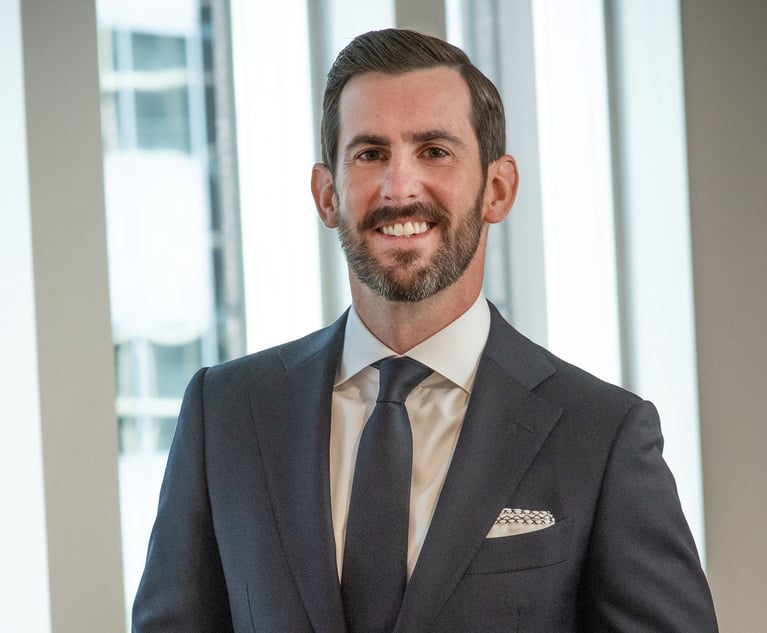Don't Minimize the Importance of Conflicts of Interest Policies for Your Nonprofit Board
The overwhelming majority of business leaders and philanthropically inclined citizens who join nonprofit boards have the best of intentions.
February 21, 2018 at 04:55 PM
6 minute read

The overwhelming majority of business leaders and philanthropically inclined citizens who join nonprofit boards have the best of intentions. They typically are passionate about the cause(s) the board supports and want to give back to an organization that means so much to them both personally and to the community where they live.
On rare occasions, a small minority of board members can look to leverage its involvement on a board for self-serving purposes, which could impact all the members if the organization's mission and fiduciary duties aren't appropriately outlined.
Therefore, it's important for policies, procedures and expectations to be reviewed, updated and signed annually.
A conflicts of interest policy is among the most important documents to update and maintain, especially for a non-profit board. In my experience, however, not enough organizations have them in place.
Why Is a Conflicts of Interest Policy So Important?
According to the IRS (and any number of recent headlines), non-profits are under a microscope because of the perception that board members often unfairly benefit financially or in other ways from the donations made to the charity.
One of the best examples of the dangers of operating disreputable charities came to light in a Tampa Bay Times investigative piece on the worst charities in America, which found one non-profit guilty of diverting more than $110 million intended for sick children to its corporate officers. While this is an example of extreme behavior, it does highlight the kind and extent of damage that can be done absent appropriate internal controls. Among those necessary internal controls are well-drafted conflicts of interest policies.
Well-drafted conflicts of interest policies protect the charity and its board against charges of impropriety. For example, if a board member would influence the decision of his fellow directors to sign a contract for services provided by that board member's business, it would be a conflict of interest because the board member would benefit financially from this type of agreement. Accordingly, the conflicts of interest policy would bring the conflict to light and prevent the conflicted Board member from participating in decisions related to that contract.
Potential conflicts of interest also come into play when board members decide on compensation or benefits they receive for their role overseeing the organization. Policies are necessary to outline the manner in which board members impacted by the conflicts can disclose the facts about the situations and potentially recuse themselves from voting on a particular issue.
Excessive compensation and extravagant gifts to board members are also prime examples of neglecting a non-profit's mission in the service of private interests. These types of inappropriate forms of compensation would be prohibited by a conflicts of interest policy.
The Times investigative series provides an apt litmus test for evaluating conflicts of interest, commonly known in legal and crisis PR circles as the “front-page test.” In other words, if a member of your organization's actions and decisions for the nonprofit were splashed on the front page of a newspaper, would the average person identify a conflict?
Would it be easy for everyone to recognize how the board member gave preferential treatment to his or her own interests ahead of the charity's?
What is the potential reputational damage to the nonprofit if these conflicts become public?
As this test illustrates, it's critical for non-profits to be as transparent as possible in avoiding both the appearance and reality of any inappropriate benefits—financial or otherwise—for its board members.
In a 24-hour news cycle, merely the perception of irregular or inappropriate activity could doom an organization's future.
A charity could lose its tax-exempt status if it strays from its stated purpose and instead serves the private interests of those who run it.
In addition, conflicts that are improperly managed can result in significant penalties against a board member who benefits from the conflict as well as the non-profit itself.
How Can I Protect My Organization?
For starters, your conflicts of interest policy should require anyone on the board with a conflict or potential conflict to disclose what the conflict might be and exclude this particular board member from voting on issues where conflicts or potential conflicts exist.
Beyond those two basic building blocks, the IRS Form 990, which is the required financial disclosure form charitable organizations must annually make available to the public, doesn't just compel the non-profit to reveal whether or not it has a conflicts of interest policy, it also requires the charity to share the procedure the organization uses to resolve and manage conflicts. Therefore, each nonprofit needs to determine how the board will manage the conflict.
Best practices to help the organization determine how to address conflicts include:
- Boards must continually educate board members on the types of relationships and situations that might give rise to conflicts of interest.
- Boards should determine if their conflicts of interest policies are both clear and clearly followed.
- Boards should determine within these policies when a conflict is permissible and impermissible.
- Board members should be required to disclose conflicts before any vote.
- Board members, per written guidelines in a conflicts of interest policy, should recuse themselves from a vote or discussion on a topic where a potential conflict exists.
- Board minutes should include when and if members disclose conflicts, how the conflict was addressed and when the board member with the potential conflict abstained from voting.
- Boards should distribute an annual questionnaire to identify any conflicts or anticipated conflicts for its members.
- Board members should disclose if they have any existing or potential conflicts and share potential conflicts as they arise.
- Boards should simulate scenarios—during at least one board meeting annually—when the disclosure of theoretical conflicts occurs and use the conflicts of interest policy to inform how the organization would handle the situations.
Remember, conflicts of interest policies should vary from organization to organization and range in type. Conflicts aren't always financial in nature. Board members are accountable to the donors, stakeholders and diverse memberships of their organizations.
It is their duty to serve the mission of the non-profit and not merely their own self-interests. The nonprofit, using protections like a well-defined conflicts of interest policy, has an obligation to protect itself and ensure its intended purpose is being fulfilled.
Patricia E. Farrell is an attorney at Pittsburgh-based law firm Meyer, Unkovic & Scott. She focuses her practice on corporate and business law services. She can be reached at [email protected].
This content has been archived. It is available through our partners, LexisNexis® and Bloomberg Law.
To view this content, please continue to their sites.
Not a Lexis Subscriber?
Subscribe Now
Not a Bloomberg Law Subscriber?
Subscribe Now
NOT FOR REPRINT
© 2025 ALM Global, LLC, All Rights Reserved. Request academic re-use from www.copyright.com. All other uses, submit a request to [email protected]. For more information visit Asset & Logo Licensing.
You Might Like
View All
Neighboring States Have Either Passed or Proposed Climate Superfund Laws—Is Pennsylvania Next?
7 minute read
Seven Rules of the Road for Managing Referrals To/From Other Attorneys, Part 2
6 minute read
With New Civil Jury Selection Rule, Litigants Should Carefully Weigh Waiver Risks
6 minute readTrending Stories
Who Got The Work
J. Brugh Lower of Gibbons has entered an appearance for industrial equipment supplier Devco Corporation in a pending trademark infringement lawsuit. The suit, accusing the defendant of selling knock-off Graco products, was filed Dec. 18 in New Jersey District Court by Rivkin Radler on behalf of Graco Inc. and Graco Minnesota. The case, assigned to U.S. District Judge Zahid N. Quraishi, is 3:24-cv-11294, Graco Inc. et al v. Devco Corporation.
Who Got The Work
Rebecca Maller-Stein and Kent A. Yalowitz of Arnold & Porter Kaye Scholer have entered their appearances for Hanaco Venture Capital and its executives, Lior Prosor and David Frankel, in a pending securities lawsuit. The action, filed on Dec. 24 in New York Southern District Court by Zell, Aron & Co. on behalf of Goldeneye Advisors, accuses the defendants of negligently and fraudulently managing the plaintiff's $1 million investment. The case, assigned to U.S. District Judge Vernon S. Broderick, is 1:24-cv-09918, Goldeneye Advisors, LLC v. Hanaco Venture Capital, Ltd. et al.
Who Got The Work
Attorneys from A&O Shearman has stepped in as defense counsel for Toronto-Dominion Bank and other defendants in a pending securities class action. The suit, filed Dec. 11 in New York Southern District Court by Bleichmar Fonti & Auld, accuses the defendants of concealing the bank's 'pervasive' deficiencies in regards to its compliance with the Bank Secrecy Act and the quality of its anti-money laundering controls. The case, assigned to U.S. District Judge Arun Subramanian, is 1:24-cv-09445, Gonzalez v. The Toronto-Dominion Bank et al.
Who Got The Work
Crown Castle International, a Pennsylvania company providing shared communications infrastructure, has turned to Luke D. Wolf of Gordon Rees Scully Mansukhani to fend off a pending breach-of-contract lawsuit. The court action, filed Nov. 25 in Michigan Eastern District Court by Hooper Hathaway PC on behalf of The Town Residences LLC, accuses Crown Castle of failing to transfer approximately $30,000 in utility payments from T-Mobile in breach of a roof-top lease and assignment agreement. The case, assigned to U.S. District Judge Susan K. Declercq, is 2:24-cv-13131, The Town Residences LLC v. T-Mobile US, Inc. et al.
Who Got The Work
Wilfred P. Coronato and Daniel M. Schwartz of McCarter & English have stepped in as defense counsel to Electrolux Home Products Inc. in a pending product liability lawsuit. The court action, filed Nov. 26 in New York Eastern District Court by Poulos Lopiccolo PC and Nagel Rice LLP on behalf of David Stern, alleges that the defendant's refrigerators’ drawers and shelving repeatedly break and fall apart within months after purchase. The case, assigned to U.S. District Judge Joan M. Azrack, is 2:24-cv-08204, Stern v. Electrolux Home Products, Inc.
Featured Firms
Law Offices of Gary Martin Hays & Associates, P.C.
(470) 294-1674
Law Offices of Mark E. Salomone
(857) 444-6468
Smith & Hassler
(713) 739-1250






